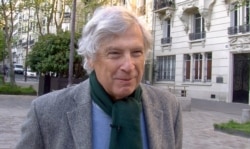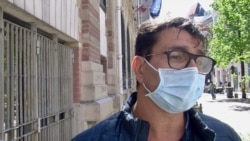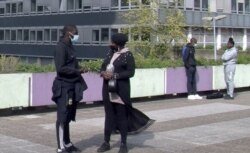The trial of former Minneapolis police Officer Derek Chauvin made headline news in France. But much of the reporting about the trial, and its underlying themes of police violence and racism, largely zoomed in on the United States.
“I think it’s viewed as an American problem with some resonance in France,” said Steven Ekovich, a U.S. politics and foreign policy professor at the American University of Paris.
"It also feeds into a certain strain of French anti-Americanism, on the left and on the right, so that the French can moralize about the United States, and its difficulties and its flaws,” he said.
That wasn’t the case last year, when George Floyd’s death caused many French to look inward. They joined spreading global protests for police accountability.
Traore death
Along with Floyd, many chanted the name of Frenchman Adama Traore, 24, whose family said he died under circumstances similar to Floyd’s, although that claim is disputed. The Black American’s death opened a broader spigot here of soul-searching about France’s colonial past and continuing injustices today.
French authorities vowed zero tolerance of police racism and brutality and pledged to ban a controversial police chokehold. President Emmanuel Macron called racial profiling "unbearable.”
Police representatives deny systemic racism. They say police are overworked and underappreciated as they tackle violence in tough neighborhoods, and they sometimes become targets of terrorism.
David-Olivier Reverdy of the National Police Alliance union said the country’s police aren’t racist. To the contrary, he said, they’re Republican and diverse, from all ethnic origins and religions. There may be some problematic individuals, he added, but the force itself isn’t racist.
Critics argue otherwise. A 2017 report by an independent citizens rights group found young Black or Arab-looking men here are five times more likely to be stopped for police identity checks than the rest of the population. Four Paris police officers were suspended last November after TV footage showed them punching a Black music producer. In January, six nongovernmental groups announced the country’s first class-action lawsuit on alleged racial profiling by police.
'Struggling' for a decade
“We’ve been struggling with the state for 10 years,” said Slim Ben Achour, one of the lawyers representing the groups in the case.
“The French Supreme Court convicted the state in November 2016 for discrimination, and after that we could have expected from the state … which should respect the rule of law — to do police reform. They have done nothing,” he said.
Allegations of police violence and racism are an old story in France. In 2005, the deaths of two youngsters fleeing police sparked rioting in the banlieues — code word for the multicultural, working-class suburbs ringing cities here. Activists point to bigger, long-standing inequalities going far beyond policing.
Some aren’t waiting for change from above. In the Paris suburb of Bobigny, youth group Nouvel Elan 93 is mentoring youngsters, helping them with schoolwork and giving them alternatives to hanging in the streets.
One of Nouvel Elan’s founders, Aboubacar N’Diaye, said the group is trying to push youngsters to the maximum of their potential. They’re talented, he said, in sports, music, theater — everything.
N’Diaye said Floyd’s death has resonated in this community and that it could happen to Blacks here like him. There’s a close relationship, he added, in the protests for Floyd and Traore.
He and other activists said it would take time for the lessons from Floyd’s death — and France’s colorblind creed of liberty, equality and fraternity —to take hold.











